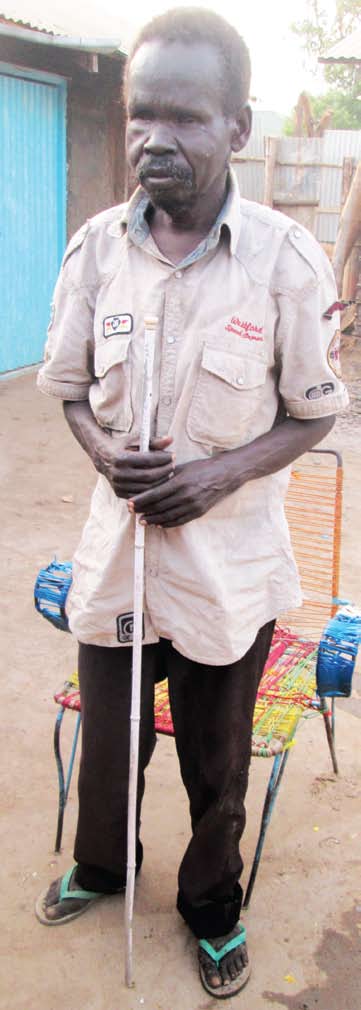BY MORRIS DOGGA LUWO LOGODO
Tapping his metallic walking stick on the ground, Paulino Laku Michael, 59, exits his zinc and iron house, as his two children Emmanuel Paulino, 15, and Michael Paulino, 8, wash their legs in preparation for school.
“Is it not coming to rain?” Laku asks.
“No, the sky is clear,” Emmanuel answers.
The sons enter the house. Laku re-appears from the back of the house.
“We are now going to school” says Michael as he exits the house in a school uniform.
After the sons have left, Laku picks up his stick, taps the ground to find the chair where he is supposed to sit. His wife, Grace Gire, brushes her teeth at the corner of the house.
Minutes later, Laku picks his walking stick, exits the gate as the wife, Grace Gire, also sets off for Suk Melishia, a market about half a kilometer away.
He almost walks into a bam- boo fence as he steps into the gravel road outside his home. Occasionally, he senses some- one walking beside him. His hand out stretched, he murmurs: “Saidu al meskin (help the poor).”
The man, walking with two children in blue shorts and white shirts, presumably headed to school, drops a 5 pound (10 US cents) note into Laku’s hands.
“Thank you very much,” Laku says as he places the money into his trousers pocket. “May God bless you.”
At one point, he steps into black, stagnant water from a bathing shelter that channels into the road.
With the help of people of good will, 30 minutes later, Laku reaches Lybia market, a half a kilometer from his home.
“Saidu al meskin”
“Go away,” says a woman selling tea at the market. “Don’t disturb people in the morning like this.”
Laku ignores the woman, taps the ground to find a place to sit.
He settles on the stairs at the entrance to a shop, holding his cheeks.
Every now and then someone drops money into his hand.
NOT ALWAYS BLIND
Born in 1957, Paulino was not always blind. “I became blind when I was 20 years” he says. “Before I became blind, I was doing everything for myself.”
His eyes are teary cheeks.
Growing up with his parents in Dolo payam of Rokon, Laku’s education was cut short when his eye problems started. He was 20 and had just completed high school. “Some white, sticky liquids started coming out from my Eye,” Laku says, “I stayed in the Chinese Hospital for six months, but nothing changed.”
Laku stayed with the sister Bulluk, but when the sister mar- ried and moved to Rejaf, Laku was left alone. There was no one to cook or take care of him. He decided to go begging. Some people would give him food stuffs; others would give him money.
Laku recalls that first day, in 1995. It was not easy. “The first day I went to beg, I got only 3 [dinar],” he says. “But I didn’t give up.”
He met his wife in 1997. The wife was also half-blind.
Every day, they both go sepa- rate ways to beg.
RAINY DAY
As for now, begging seems the only way Paulino and his family is surviving from. “If I don’t go to the street and beg, my family does not eat,” he says. Cheeks in his palm, he falls silent for a couple of minutes.
It’s not always easy. One day last year, when he and his wife did not go out to the street to beg, the family went to bed hun- gry. The worst times are when the rains come. “When it rains, I get small amount” he says “I can’t move to faraway places.”
He’s lucky, today it didn’t rain. At around 4:00pm, Paulino sets walking stick left and right as he struggles to find his way.
“Go this way,” a man selling timbers directs him.
Laku has hardly walked for two minutes when his son, Emmanuel, comes looking for him.
“It’s me, your son,” Emmanuel says as he holds his father’s walking stick. “I have come to look for you”.
He empties his pockets and places the money into Emmanuel’s hands. “You count this money,” he tells the son.
“It’s 30 pounds,” the son replies after counting.
“Thank you Lord for what you have given me today,” Laku says, his left hand stretched out to the
sky. “Today is a better day” he says. “Take me quickly home so you can go back to the market to buy maize floor and dagga fish for us.”




